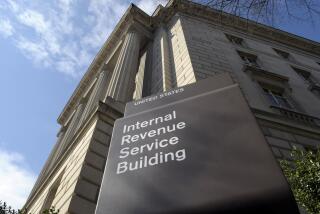Federal deficit hits record $455 billion
WASHINGTON — Compounding terrible economic news, budget officials announced Tuesday that the federal deficit has soared to a record $455 billion, injecting new urgency into the closing days of the presidential campaign about spending in Washington, including efforts to stem the financial disaster.
The final accounting for fiscal 2008 produced a larger shortfall than had been projected, reflecting the start of federal efforts to address the economic emergency. It is certain to become a significant issue in the campaign, confronting the candidates with new questions about their growing slate of proposals for new spending and tax cuts at a time when red ink is surging.
“The reality is that the next president will be inheriting a fiscal and economic mess of historic proportions -- the legacy of President Bush’s failed policies,” said Sen. Kent Conrad (D-N.D.), chairman of the Senate Budget Committee. “It will take years to dig our way out.”
The deficit is likely to be even bigger next year as the country copes with the worst financial crisis since the Depression.
The new figure breaks the previous record deficit of $413 billion in 2004 and more than doubles the 2007 deficit of $162 billion. It has focused new attention on government spending, coming just days after the National Debt Clock in New York City ran out of digits to record the overall national debt, which passed $10 trillion.
In Congress, the record deficit is likely to intensify debate over Democrats’ efforts to pass another economic stimulus package, perhaps worth $150 billion, and over the issue of fiscal discipline.
Administration officials blamed the deficit in large part on the nation’s economic troubles, which produced lower than expected tax revenues and led to passage of an economic stimulus package that included tax rebates.
The figures were released as the Treasury Department detailed its plans to inject $250 billion into banks, part of a $700-billion financial rescue plan recently approved by Congress.
As part of the bailout, Congress lifted the ceiling on the national debt to $11.3 trillion from $10.6 trillion. But White House officials expressed hope that the government’s actions would help improve the economy and, in turn, reduce the deficit.
“If we’ve gotten this thing right on dealing with the financial crisis . . . then our economy can start producing revenue again,” said Stephen McMillin, deputy director of the White House budget office.
The White House, attempting to portray the deficit number in the most positive light, said that the red ink, measured as a share of the economy, equaled 3.2% of the gross domestic product -- below the record of 6%, set in 1983 after President Reagan’s tax cuts were implemented.
“The bipartisan stimulus bill and the slow economy are the primary reasons for the increase in deficit,” White House budget director Jim Nussle said in a statement. “I am confident the economy can return to stronger growth with a declining deficit -- after working through current challenges -- if Congress limits wasteful and excessive spending.”
Democrats blamed Bush and his Republican allies in Congress for wiping out a budget surplus inherited from the Clinton administration through tax cuts that have been criticized for favoring the wealthy and through other spending.
Rep. Paul D. Ryan of Wisconsin, the top Republican on the House Budget Committee, said the deficit was a “warning sign of the immense fiscal challenges just beginning to arise with the retirement of the baby boomers” and should be viewed as a call for Congress to control spending.
--
More to Read
Get the L.A. Times Politics newsletter
Deeply reported insights into legislation, politics and policy from Sacramento, Washington and beyond. In your inbox three times per week.
You may occasionally receive promotional content from the Los Angeles Times.











